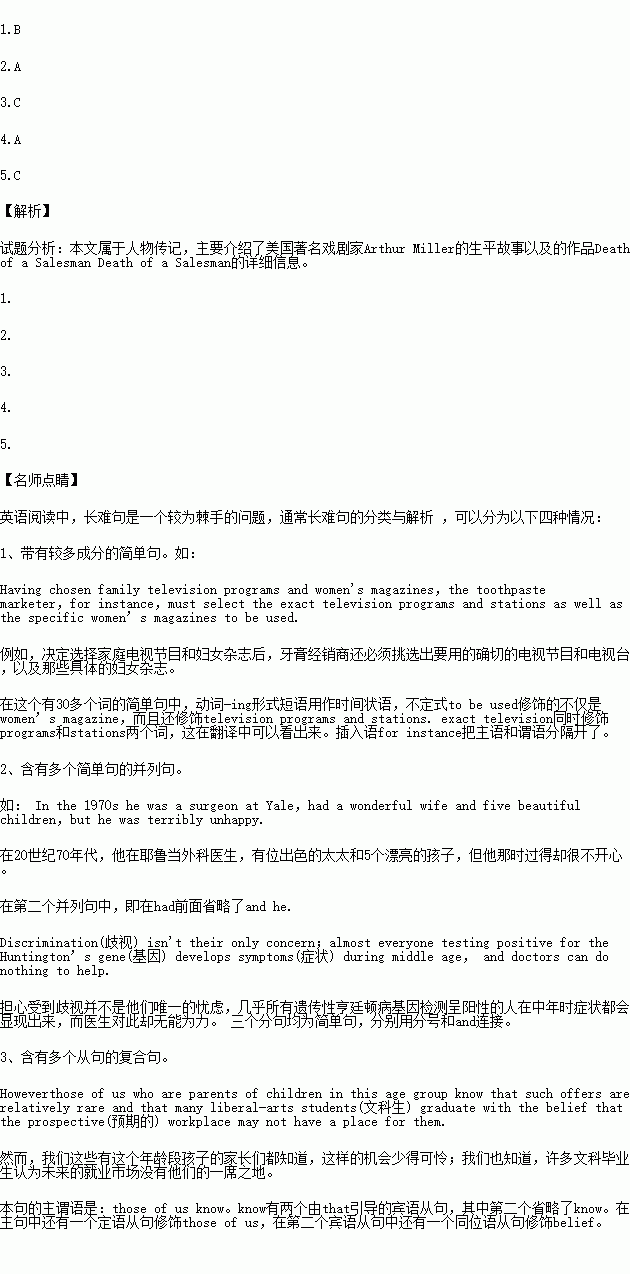题目内容
阅读下列短文, 从每题所给的四个选项(A、B、C和D)中, 选出最佳选项。
Arthur Miller(1915-2005) is universally recognized as one of the greatest dramatists of the 20th century. Miller’s father had moved to the USA from Austria-Hungary, drawn like so many others by the “ Great American Dream”. However, he experienced severe financial hardship when his family business was ruined in the Great Depression (大萧条时期) of the early 1930s.
Miller’s most famous play, Death of a Salesman, is a powerful attack on the American system, with its aggressive way of doing business and its insistence on money and social status as indicators (标志) of worth. In Willy Loman, the hero of the play, we see a man who has got into trouble with his system, Willy is “burnt out” and in the cruel world of business there is no room for sentiment (情绪): if he can’t do the work, then he is no good to his employer, the Wagner Company, and he must go. Willy is painfully aware of this, and at a loss as to what to do with his lack of success. He refuses to face the fact that he has failed and kills himself in the end.
When it was first staged in 1949, the play was greeted with enthusiastic reviews, and it won the Tony Award for Best Play, the New York Drama Critics’ Circle Award, and the Pulitzer Prize for drama. It was the first play to win all the three of these major awards.
Miller died of heart failure at his home in Roxbury, Connecticut, on the evening of February 10, 2005, the 56th anniversary of the first performance of Death of a Salesman on Broadway.
1.Why did Arthur Miller’s father move to the USA?
A. He suffered from severe hunger in his home country.
B. He was attracted by the “Great American Dream”.
C. He hoped to make his son a dramatist.
D. His family business failed.
2.The play Death of a Salesman _____.
A. exposes the cruelty of the American business world
B. discusses the ways to get promoted in a country
C. talks about the business career of Arthur Miller
D. focuses on the skills in doing business
3.What can we learn about Willy Loman?
A. He treats his employer badly.
B. He runs the Wagner Company.
C. He is a victim of the American system.
D. He is regarded as a hero by his colleagues.
4.After it was first staged, Death of a Salesman _____.
A. achieved huge success
B. won the first Tony Award
C. was warmly welcomed by salesmen
D. was severely attacked by dramatists
5. What is the text mainly about?
A. Arthur Miller and his family.
B. The awards Arthur Miller won.
C. Arthur Miller and his best-known play.
D. The hardship Arthur Miller experienced.
书面表达
假设你校英语报正在征集一篇介绍名人生平的文章。请根据以下表格写一篇稿件向校报投稿,简要介绍德国作曲家贝多芬 (Ludwig van Beethoven)
贝多芬 | 生平事迹 |
出生日期、地点 | 1770年12月出生于德国波恩(Bonn) |
童年时期 | 自幼跟父亲学音乐,很早就显露了音乐才能,八岁开始登台演出 |
成年后 | 在事业获得巨大成功的同时饱受耳聋折磨1827年去世 |
作品 | 一生完成了一百多部作品,其中有交响乐9部,影响至今 |
注意:
1. 词数100左右;
2. 可以适当增加细节,以使行文连贯;
3. 参考词汇:composer 作曲家 symphony交响乐 masterpiece 作品。

